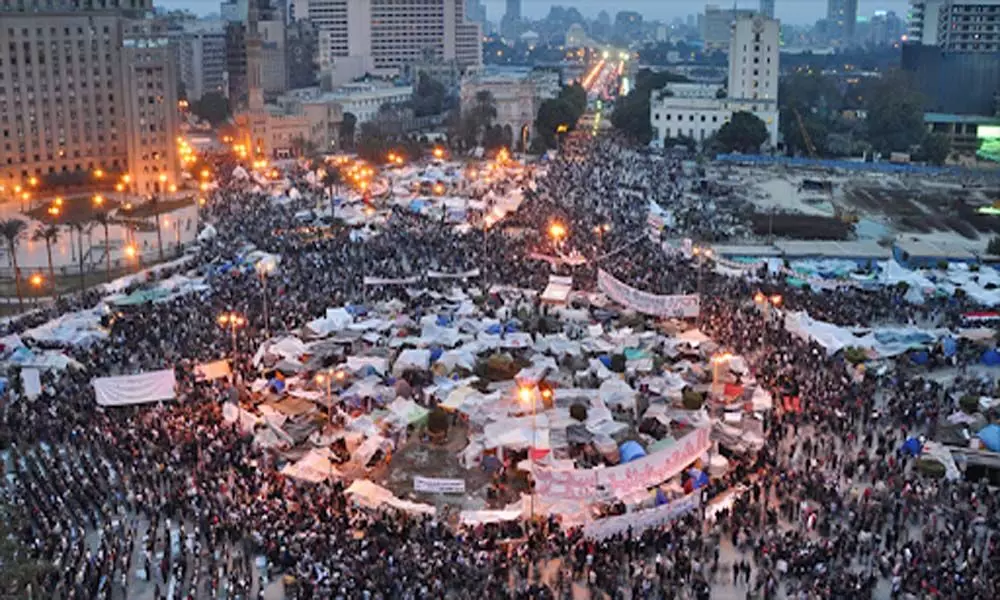Is last hope of Arab Spring is at risk?
How will the forces that coalesced during the Arab Spring respond to this summer of discontent? The early signs are not good
image for illustrative purpose

AMID Tunisia's political upheaval, it is easy to hear echoes of the events in Egypt eight years ago. In the summer of 2013, widespread protests against an unpopular Islamist government allowed General Abdel-Fattah El-Sisi to take power in what amounted to a coup.
Tunisia's President Kais Saied may not wear military fatigues, but he's doing a pretty good Sisi impression nonetheless: Taking advantage of demonstrations against an unpopular Islamist-backed government, he has suspended the country's elected parliament and sacked the Prime Minister, effectively assuming dictatorial authority over the country.
Only months ago, Tunisia was being celebrated anew as the only country that remained a democracy in the decade after the Arab Spring. There is a real risk the gains secured then may now be lost, just as they were in Egypt. The task of forestalling that dreadful outcome falls again to the Tunisians who overthrew their dictator in January 2011, and to the two institutions that played pivotal roles back then: the military and the labour unions.
The military had refused the dictator's orders to crack down on the protests, and the labour organisations had ensured a smooth transition to civilian rule — for which four groups, known collectively as the National Dialogue Quartet, were awarded the Nobel Peace Prize in 2015.
How will the forces that coalesced during the Arab Spring respond to this summer of discontent? The early signs are not good.
Saied's power grab has been welcomed in the streets by the anti-government protestors. Fed up with the serial failures of the leaders they elected — unemployment, one of the root causes of the Arab Spring, remains rampant — many Tunisians are inclined to give their president the benefit of the doubt. He has portrayed himself as incorruptible and unconnected to the political parties that have let them down. He says he will appoint a new Prime Minister, but didn't say when. Nor has he indicated when or if parliament would be reconvened.
He also seems to have coopted the military, giving it the crucial responsibility for administering the national vaccination program last week. The generals, having fallen in lockstep behind the president, can expect to be rewarded with even more responsibilities in the days ahead.
The Tunisian General Labour Union, the country's largest, most powerful labour organisation and one of the four Nobel winners, has adopted a wait-and-see posture. Better known by its French acronym UGTT, it has issued only a vague statement about the importance of "constitutional legitimacy" and the need for national dialogue.
But all three forces — the protestors, the military and the unions — will face tougher tests in the days ahead. The political forces that dominate parliament have denounced Saied's actions as a coup. It is only a matter of time before Ennahda, the main Islamist party, and secular groups mount demonstrations of their own.
The protestors who celebrated the suspension of democracy will then have to decide whether they will return to the street to defend the president, triggering a face-off with great potential for violence. If he sticks to the Sisi playbook, Saied will order a crackdown against his opponents, putting the military in a familiar quandary of whether to protect the people or the president.
But most likely, the decisive part will be played by the unions. The presence of strong, politically active civil-society institutions was the key differentiator between Tunisia and Egypt in the aftermath of the Arab Spring, and it might be decisive again. Much will depend on the disposition of the UGTT, which represents most of the country's civil service and has a demonstrated capacity to bring all of Tunisia to a standstill.
This gives it the power, if it is so minded, to prevent Saied from fully reprising Sisi's repression of the political opposition. That's why Ennahda's leader, Rachid Ghannouchi, in his first reaction to Saied's announcement, appealed to the UGTT's secretary general, Noureddine Taboubi, "to restore democracy."
To do so would require exercising some muscle memory. Since it was ennobled in 2015, the UGTT has receded into its role as a union. More often than not, it has been a hindrance to progress in Tunisia, standing foursquare against much-needed economic reforms such as paring down the civil service and selling off State enterprises.
But its leadership takes great pride in its history as an anti-colonial force before Tunisia's 1956 independence from the French, and in its more recent function as a check on government power. As one top leader told me two years ago: "UGTT is different from any union in the world. We fight not just for bread and clothing, but for national dignity."
It's time for the UGTT to suit up for that fight again. (Bloomberg)

